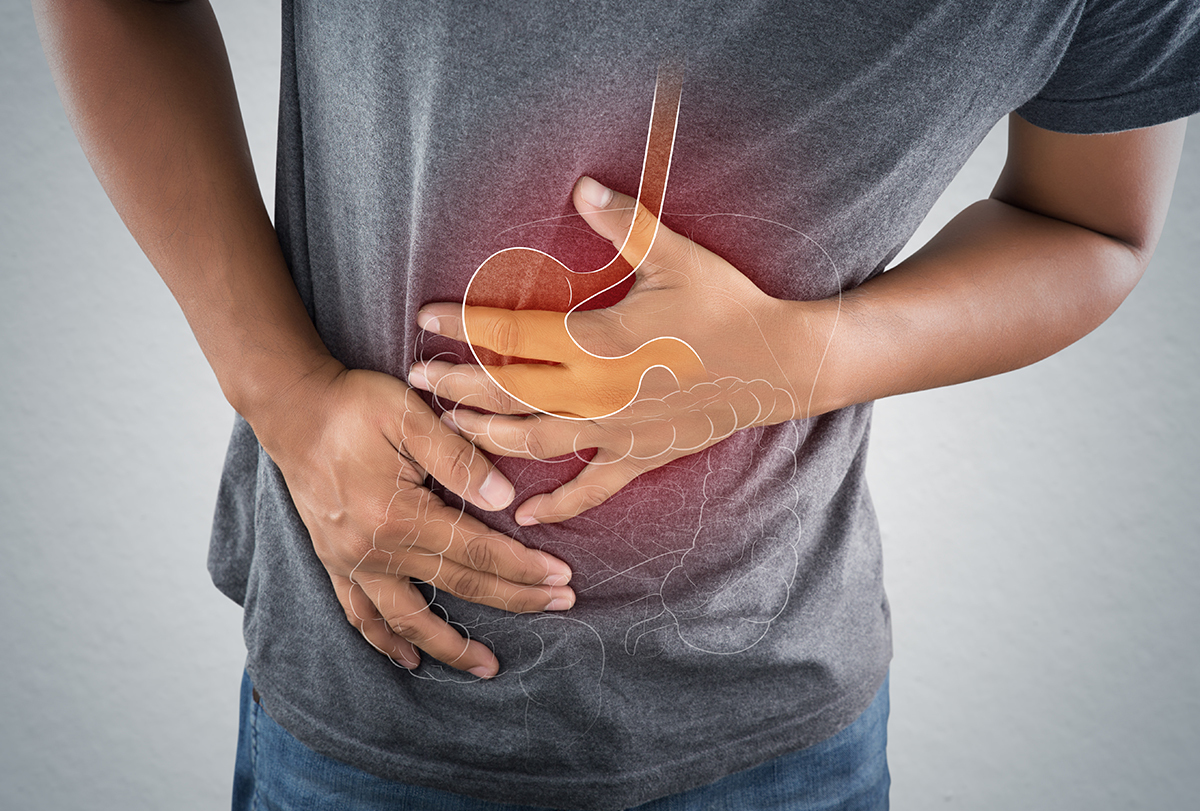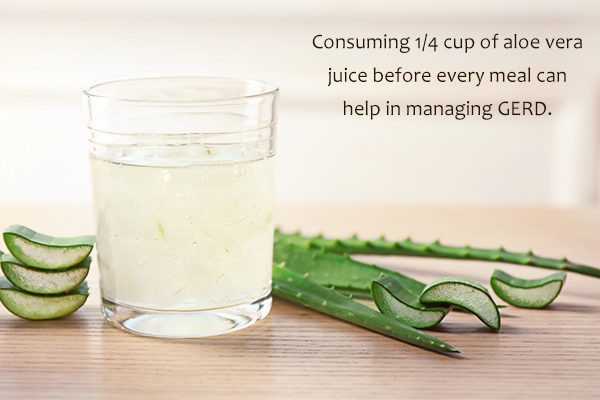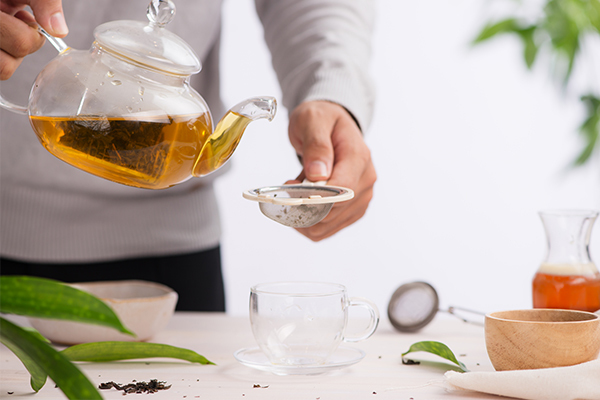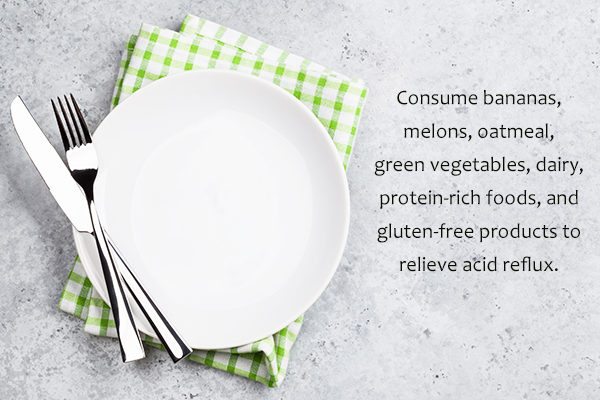In this article:
Acid reflux is the regurgitation of acidic stomach contents into the esophagus due to a damaged or weak lower esophageal sphincter (LES). This sphincter is a circular group of muscles that form a valve at the end of the food pipe that opens into the stomach.

These muscles remain tightly shut at all times and relax only to allow the passage of swallowed food into the stomach. A dysfunctional LES fails to close properly, thus allowing the backflow of stomach contents into the esophagus.
When this becomes a frequent or chronic occurrence, the condition is referred to as gastroesophageal reflux disease (GERD), which can greatly compromise your quality of life by impeding your daily activities, causing sleep disturbances, and limiting your food choices.
Home Remedies for GERD
The following remedies are not scientifically backed cures for GERD but have provided symptomatic relief to plenty of general users.
1. Drink aloe vera juice

A randomized controlled trial found aloe vera to be a safe and effective adjunct remedy for GERD, which can help curb stomach inflammation caused by the corrosive action of excessive digestive acids. (1) However, further research is needed to assess the exact role of aloe vera in treating GERD.
How to use:
Consume ¼ cup of aloe vera juice before every meal. Avoid overuse as it can counteract as a laxative.
Aloe vera intake may help reduce the inflammation caused by stomach acids and thereby soothe the digestive tract. This can provide some much-needed relief from the discomforting symptoms of acid reflux.
2. Consume probiotics
Acid reflux can sometimes be traced back to an imbalance in the gut bacteria, which can be corrected by consuming foods or supplements containing beneficial bacteria known as probiotics.
The extended use of medications for treating GERD can also disturb the gut microflora and cause digestive problems, such as functional dyspepsia. (2)
How to use:
- Include foods such as yogurt, kimchi, sauerkraut in your daily diet, or ask your doctor to start you on a supplement. (3)
- You may also ask your doctor to start you on probiotic supplements.
- However, always stick to the recommended intake since the overuse of probiotics can increase digestion and cause diarrhea.
Probiotics are beneficial bacteria that can help restore a healthy gut microbiota, which is a prerequisite for proper digestion and curbing acid reflux.
3. Chew gum
Chewing sugarless gums, cinnamon gums, or gutsy gums after meals can provide relief from acid reflux. (4)(5) Avoid mint-flavored gums as mint helps relax the LES and can aggravate acid reflux and heartburn. (6)
However, chewing gum is not a substitute for clinical treatment as it only provides temporary symptomatic relief rather than addressing the underlying cause of GERD.
Chewing gum helps in increasing saliva production. Excess saliva can help in neutralizing and washing down the acid and soothing the esophagus.
4. Use baking soda as an antacid
The alkaline property of baking soda can neutralize the acidic pH of your stomach and can provide temporary relief from acid reflux. Regular use can be counterproductive due to its high sodium content, which can inhibit the absorption of other medications in the bloodstream.
How to use:
- Add ½ teaspoon of baking soda to half a cup of water (125 ml).
- Stir it well so that it dissolves completely, and then drink this solution as an antacid.
Note: Further studies are required to verify the use of baking soda for acid reflux treatment. Avoid its usage if you are on a low-sodium diet. Pregnant women should avoid consuming baking soda as it can cause fluid buildup, which may be harmful to the baby.
Baking soda mixed in water can work as an antacid when used in proper amounts, but it is best to consult your doctor before using this remedy.
5. Consume diluted apple cider vinegar
Consumption of diluted apple cider vinegar (ACV) can help lower the acidity in the stomach by enhancing the digestion process, although further studies are needed to support this claim.
How to use:
- ACV should be used in small quantities, that is, 1-2 tablespoons in 1 ounce of water. (7)
- Pickle juice contains a lot of vinegar and works similarly to ACV. Pickle juice is more palatable than vinegar for many people and just as effective.
Note: Undiluted vinegar is acidic enough to cause tooth decay and must be avoided. Moreover, this remedy is not recommended for people with diabetes, as ACV intake can negatively affect insulin levels.
ACV is mildly acidic itself but has proven helpful in neutralizing stomach acids in some cases. This remedy may not work for all people and can even aggravate the condition by introducing more acid to the digestive system.
However, there is a possibility that the “mother” or beneficial bacteria, found in unfiltered ACV can help stimulate the digestive process and curb the production of excessive digestive acids.
Users will have to try this remedy for themselves to know if it’s good for them, but only after checking with their doctor. The medicinal intake of ACV is best avoided in cases of severe GERD.
6. Try herbal teas

Several herbal teas may help in reducing acid reflux, according to anecdotal evidence. (8) Herbs are credited with significant therapeutic properties that may help mitigate the discomfort associated with this condition, often by acting as an acid buffer.
Ginger tea is a popular beverage in this regard as it aids proper digestion and reduces the acidity of several foods. (9)
Other herbs that can potentially curb the excessive secretion of stomach acids and prevent them from backing up in the esophagus include chamomile, (10) licorice, (11) marshmallow, slippery elm, and green tea.
However, these herbal teas are not a scientifically proven cure for acid reflux, but adjunct dietary aids for relieving its symptomatic discomfort. They have delivered good results for many users, which is the basis for their inclusion in this list of acid reflux remedies.
How to use:
- Make your own tea by steeping the preferred herb in hot (not boiling) water for a few minutes and adding a bit of lemon or honey to make it more appetizing.
- Use instant herbal teas that are available as loose extracts and tea bags.
Note: Always check with your doctor before starting the medicinal use of these herbs to avoid any side effects.
7. Eat more of mustard
Mustard seeds figure among alkaline foods, which means they can counteract the stomach acids and increase the pH levels in your stomach.
The more alkaline the stomach, the lower is the chance of acid reflux. That said, you must remember that this remedy is purely anecdotal and is recommended based on positive user reviews rather than scientific support.
Thus, the digestive benefits of mustard seeds for reducing acidity still need to be verified by evidence-based research.
How to use:
- Spice up your dishes with mustard seeds or powder, keeping your daily intake to around 2 teaspoons.
- You can also mix 2 teaspoons of whole or powdered mustard seeds in half a glass of water and drink this tonic to curb acid reflux.
Note: Before starting the medicinal intake of mustard seeds for relieving acid reflux, you must discuss it with your doctor to see if it is suitable for you.
Alternative Therapies
The following therapies for relieving GERD must be pursued under the supervision of an expert.
1. Acupuncture
Acupuncture can help stimulate the digestive muscles to push the food through the gastrointestinal tract, thus improving the overall digestive function.
If the food remains in the stomach for too long, the digestive bacteria keep breaking it down to produce increased amounts of gases and acids as by-products. This leads to flatulence, bloating, and acid reflux. (12)
Acupuncture is a traditional Chinese technique that is considered largely safe and effective. It involves the insertion of needles into specific points of the body, which requires the skilled expertise of a specialist. So, do not try this at home but go to a professional acupuncturist for the best results.
2. Relaxation therapy
You can try relaxation techniques such as deep breathing and yoga along with prescribed medication to improve the function of the LES and thereby reduce functional heartburn symptoms. (13)
Self-Care Tips for GERD

Small changes in your diet and lifestyle may help in managing acid reflux and GERD. These include:
1. Eating habits
Identify the foods that trigger your acid reflux, and cut them out of your diet. (6) Since GERD is associated with obesity, (14) weight loss may help in managing GERD, although this claim has not been proved yet.
Eat several small meals at regular intervals throughout the day, instead of having the standard three large meals. Maintain a gap of at least 3 hours between your meal and bedtime. Lying down immediately after eating can hamper digestion and trigger acid reflux. (15)
2. Avoid smoking and alcohol
The nicotine in tobacco relaxes the muscles of the LES and keeps it from closing properly. This allows recurrent acid reflux and heartburn. Alcohol intake can aggravate the symptoms of GERD.
3. Change your sleeping position
When you are standing or sitting, gravity pulls down the stomach acid and keeps it from rising above the midchest even during reflex. This vertical push is removed when lying down, thus allowing the acid to back up in the throat and mouth, causing irritation and sleep disturbances. (16)
Sleeping with your head raised 6 inches above the heart level can help reduce acid reflux. You can do so by propping extra pillows under your head, inclining your bed by putting a few blocks under its head-side legs, or placing a wedge below the mattress.
4. Reduce pressure on the stomach
Do not wear tight-fitting clothes or lie down immediately after eating. Avoid using multiple pillows under your head as this can also increase the pressure on your stomach.
Diet Changes for Acid Reflux Management
Certain food groups can help in alleviating the symptoms of GERD. There are also foods that can trigger acid reflux.

Foods that provide relief from acid reflux include:
- Bananas have low acid content and are rich in fiber. It can coat the esophageal lining and relieve irritation and discomfort. The fiber in bananas can help in fighting indigestion.
- Melons are rich in magnesium, which is widely incorporated in medications used to treat acid reflux. Like bananas, melons are also alkaline.
- Apricot. Daily apricot intake may improve digestive dysmotility symptoms, resulting in relief of GERD symptoms. (17)
- Oatmeal has high fiber content and enhances digestive health. It helps in combatting reflux and constipation. Also, it makes your stomach feel full. As a result, you avoid overeating, thus preventing regurgitation.
- Green vegetables such as kale, spinach, asparagus, and Brussels sprouts have low fat and sugar content, which prevents the overproduction of acid in the stomach. These vegetables also help in relieving acid reflux as they are highly alkaline.
- Milk and milk products can be consumed to provide relief. Consumption of yogurt helps in balancing the gut flora.
- Protein-rich foods, such as beans, lean meat and substitutes, soft flaked fish, and eggs, are beneficial to people suffering from acid reflux.
- A gluten-free diet is recommended for the alleviation of symptoms associated with GERD. It also helps in preventing acid reflux that can cause intestinal damage in patients who have celiac disease. (18)
Foods to be avoided when you suffer from GERD:
- Citrus fruits, such as oranges, and tomatoes have high acid content, which can trigger acid reflux.
- Fatty foods, such as cheese, prime rib, pizza, and fries, can cause heartburn. The high-fat content can also cause obesity, which increases the pressure on your stomach and the LES.
- Spicy foods can worsen the symptoms associated with GERD. It is recommended to avoid garlic and onion as well.
- Coffee can induce acid secretion and can also hamper the function of the LES.
- Alcohol and chocolates can relax the muscles of the LES and induce acid reflux.
- Carbonated drinks can cause bloating in the stomach and increase the pressure on the LES.
Most-Asked Questions About GERD

Is GERD genetic?
Several studies suggest that genes play a significant role in the development of GERD and related complications, such as Barrett’s esophagus. (19)(20)
However, more studies are needed to evaluate the role of the identified genes, which can help in the development of screening tools, biomarkers, and new therapeutic approaches to combat the disease. (19)
What is the difference between GERD and heartburn?
The upward movement of acid from the stomach to the esophagus is termed reflux. Heartburn is a burning sensation in the chest due to the presence of acid and is a symptom of reflux. GERD is a chronic condition wherein frequent acid reflux occurs.
Final Word
Living with GERD can be hard and requires daily management through dietary control, lifestyle changes, and home remedies along with the doctor-recommended medication.
If you don’t take the necessary measures to curb your acid reflux, it can greatly damage the inner walls of your food pipe and give rise to ulcers, swelling, and other such complications that can make swallowing painfully difficult.

- Was this article helpful?
- YES, THANKS!NOT REALLY


